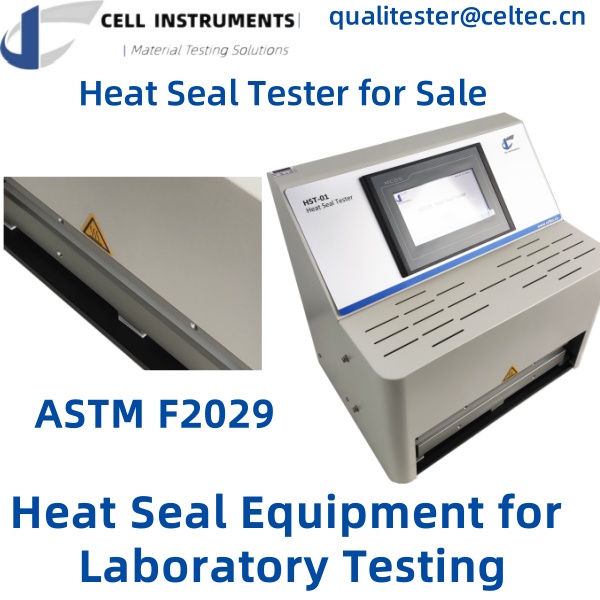In industries ranging from packaging to medical devices, the integrity of heat seals is paramount. Laboratory testing with specialized heat seal equipment plays a crucial role in ensuring these seals meet the rigorous standards required for product safety and effectiveness. This article delves into the importance of using heat seal equipment for laboratory testing, focusing on the critical role of ASTM F2029 compliance.
Einführung
Heat seal equipment for laboratory testing is essential for evaluating the performance and durability of seals in flexible packaging materials. Whether you are working with food packaging, medical devices, pharmaceuticals, or textiles, ensuring that your seals are strong, uniform, and defect-free is critical. Compliance with ASTM F2029, the Standard Test Method for Making Heat Seals, provides a recognized framework for conducting reliable and repeatable tests.
Why ASTM F2029 Matters
ASTM F2029 is the benchmark standard for heat sealability testing. It outlines the procedures for making heat seals and evaluating their strength, providing a consistent method for assessing the quality of seals across various materials. Adhering to this standard not only ensures that your products meet industry expectations but also enhances their reliability and safety.
Key Features of Heat Seal Equipment
Präzisionsprüfung
Cell Instruments’ heat seal equipment is engineered for precise control over testing parameters such as temperature, pressure, and dwell time. This precision is crucial for obtaining accurate and repeatable results, allowing for reliable evaluation of seal strength and quality.
Versatility Across Applications
Whether testing plastics, textiles, paper, or adhesives, heat seal equipment is designed to accommodate a wide range of materials. This versatility ensures that no matter your industry, the equipment can meet your specific testing needs.
Anpassungsoptionen
At Cell Instruments, we understand that testing requirements can vary significantly between different industries and applications. Our heat seal equipment can be customized to meet unique specifications, ensuring that your testing protocols are as effective and relevant as possible.
Automation for Consistency
For labs looking to increase throughput and reduce human error, automation options are available. Automated heat seal equipment streamlines the testing process, ensuring consistent application of test parameters and reducing the likelihood of variability in results.
Meeting ASTM F2029 Requirements
When conducting heat seal tests, it’s essential to follow the ASTM F2029 standard to ensure that your results are valid and recognized across the industry. Below is an overview of the steps involved:
- Vorbereitung der Prüfkörper
- Cut samples to the required dimensions and ensure they are free of contaminants or defects.
- Festlegen der Testparameter
- Select appropriate temperature, pressure, and dwell time based on the material being tested. Document these settings for consistency.
- Durchführung des Tests
- Place the sample between the heated sealing bars, apply the selected pressure, and maintain it for the set dwell time.
- Messen der Siegelfestigkeit
- After the sample has cooled, use a tensile testing machine to measure the force required to break the seal, providing a quantitative assessment of seal strength.
Applications of Heat Seal Equipment
Verpackungsindustrie
Ensuring the integrity of heat seals in food and beverage packaging is vital for maintaining product freshness and safety. Laboratory testing allows manufacturers to verify that their seals can withstand the rigors of transport and storage.
Medizinprodukte und Pharmazeutika
For medical and pharmaceutical products, reliable heat seals are essential for preventing contamination and ensuring patient safety. Heat seal equipment helps verify that seals meet the stringent requirements of these industries.
Textilien und Klebstoffe
In the textiles industry, heat-sealable fabrics require rigorous testing to ensure durability and performance. Similarly, adhesives used in heat sealing must be tested for strength and reliability to guarantee long-lasting bonds.
Warum Cell Instruments wählen?
Cell Instruments offers the best laboratory heat seal equipment designed to meet your specific needs. Our products are fully compliant with ASTM F2029, ensuring that your testing procedures adhere to industry standards. With options for customization and automation, our Heißsiegelprüfgeräts provide unparalleled precision and reliability.
Häufig gestellte Fragen
1. What is ASTM F2029, and why is it important for heat seal testing?
ASTM F2029 is the Standard Test Method for Making Heat Seals for Determination of Heatsealability of Flexible Webs as Measured by Seal Strength. It provides a recognized procedure for evaluating the strength and quality of heat seals, ensuring consistent and reliable results.
2. Can Cell Instruments’ heat seal equipment be customized for specific testing needs?
Yes, our heat seal equipment can be tailored to meet specific testing protocols or material requirements, providing a versatile tool that adapts to your lab’s needs.
3. How does automation improve heat seal testing?
Automation enhances consistency by applying test parameters uniformly across samples, reducing human error and increasing throughput, which is particularly valuable in high-volume testing environments.
4. What materials can be tested with Cell Instruments’ heat seal equipment?
Our heat seal equipment is versatile and can test a wide range of materials, including plastics, textiles, paper, and adhesives.
5. Why is precision important in heat seal testing?
Precision in controlling test parameters such as temperature, pressure, and dwell time is crucial for obtaining accurate and repeatable results, ensuring the reliability of the seals being tested.
Verwandte Produkte
Verwandter Artikel
Prüfung der Integrität von Heißsiegelungen
Prüfmethode für die Heißsiegelfestigkeit
Polyethylen-Heißsiegeltemperatur
Siegelfestigkeit von Kunststofffolien
Labor-Heißsiegelgerät für Folientests
Prüfung der Heißsiegelung von Kunststofffolien
Qualitätskontrolle für Heißsiegelungen


